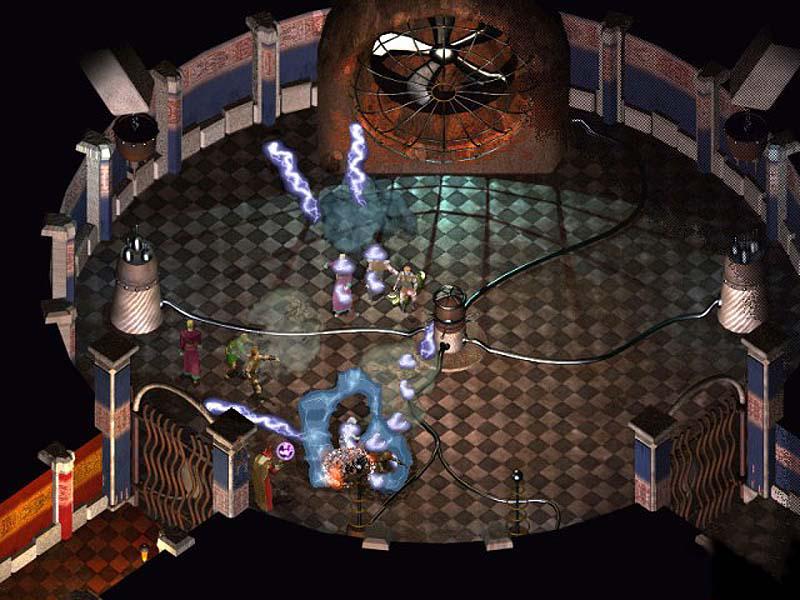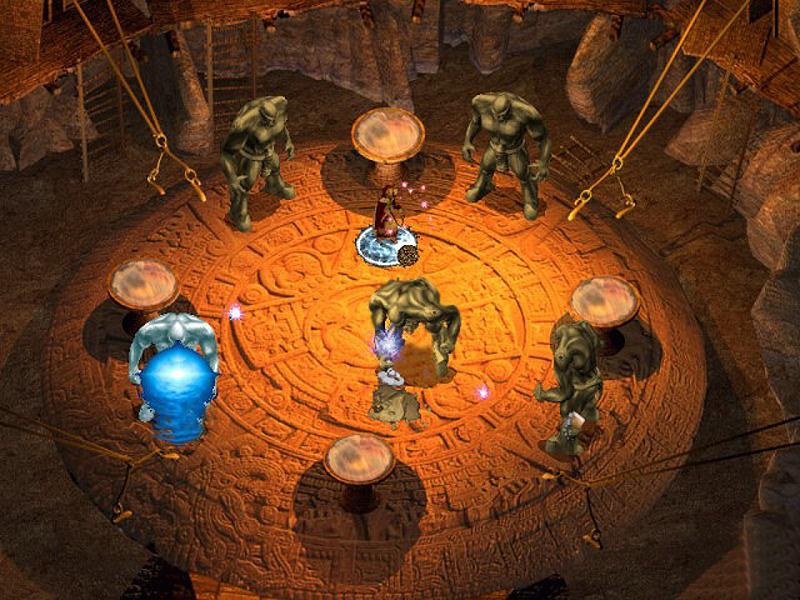|
|

|
BATTLE SYSTEM
|

|
INTERACTION
|

|
ORIGINALITY
|

|
STORY
|

|
MUSIC & SOUND
|

|
VISUALS
|

|
CHALLENGE
|
Nearly Impossible
|
COMPLETION TIME
|
25-40 hours
|
|
OVERALL
2.0/5
|
Rating definitions
|
|
|
The tragedy of Baldur's Gate II: Throne of Bhaal is one of psychology, shared by all direct sequels. The original Baldur's Gate provided a richly fertile bed of novelty mixed with potential and a healthy pinch of intrigue. Baldur's Gate II expanded upon this potential by several orders of magnitude via an epic plot, sweeping gameplay reforms, and an overall sense of polish. So while Throne of Bhaal was never meant to be "Baldur's Gate III," it remains the final chapter of the saga and has to be judged as such. With a pedigree as peerless as it has, the expectation to further raise the bar is a foregone conclusion. Simply being more of the same is not acceptable at this point; Throne of Bhaal must surpass its predecessors just as they surpassed their own. To do otherwise is to fail all gamers who bought into the promise set forth by the first two titles. Not only did Throne of Bhaal do otherwise and fail in this promise, it actually represented a regression of the series into what seemed at times to be a mockery of its former glory.
Surface analysis of both the battle system and basic interface reveals no significant changes since Baldur's Gate II. Exploration is still done from a 3/4th perspective, combat is still conducted in real time with the possibility of pausing at any moment to issue new commands, and all other game mechanics are the same. Of course, this also means that all of the flaws from the previous titles have carried over as well. While that in itself is undesirable, the very nature of the final chapter magnifies the flaws in almost crippling levels. The characters are no longer fighting rats and spiders as first-level adventurers with a reasonable cushion of poor judgment. At this stage in the game, the characters are all past the 20th level, and have the equivalent power of demigods, fighting monsters capable of killing faster than the screen can even render the death.
Battles have become either struggles against almost insurmountable odds with no room for error, or they are frivolous annoyances that merely serve to deplete resources. While this sort of "challenge" is not inherently bad, it becomes so in Throne of Bhaal's case considering the manner in which the difficulty is implemented. Simply put, the challenge is not based on strategy or tactics, but rather lies is struggling against the battle system itself. In a word, the battle system is terrible. The game may be paused at any moment so as to give the player as much time as needed to assess the situation and give new commands, but any such orders are not carried out immediately if carried out at all. Drinking the life-saving potion or casting the crucial spell to lower the enemy's defenses is accompanied by an unpredictable delay which the enemy is unbounded by. This was never a problem when ambushed by kobolds. Facing multiple liches, fallen devas, and ridiculous dragons capable of irreparably killing party members while invisible, on the other hand, is a problem.
 Not even demigods are immune to the still-lethal lightning bolt traps.
Not even demigods are immune to the still-lethal lightning bolt traps.
|
|
Indeed, the very mechanics of the game break down at these levels. Turning invisible will negate the most powerful targeted spell in the game, while Time Stop allows the already deadly bosses to slaughter your party via physical attacks with total impunity. The only way to remove potentially game-breaking status effects such as stun, confusion, and charm, which themselves are only game-breaking because there are zero defenses against them, remains Dispel Magic - a spell which automatically negates all the positive spell protections on that party member and usually on other nearby characters in the process. Some of the most powerful spells in the game are area-effect spells whose practical usefulness is completely negated by the horrible manner in which the real-time battle system operates. For example, the computer AI has no difficulty in efficiently moving NPCs out of the area to lessen the damage, while the player character AI finds it difficult to even move through doors. The power imbalance is so incredibly high due to truly asinine gameplay flaws and oversights it makes one wonder what the designers were thinking, if any thought was actually involved.
While the prior problems are certainly critical, the true regression in Throne of Bhaal is the destruction of the series' soul: exploration and plot. There is but a single area in the entire game that is not relevant to storyline. One. There are no forests, caves, or mountains to explore simply because they are there. In many ways, the Baldur's Gate series emulated the same sort of adventurous spirit inherent in games such as The Legend of Zelda by adding superfluous areas to the world map. It was never necessary to explore every screen of the Sword Coast just as it was never necessary to scout out the entirety of Hyrule. But just the fact that it is there, should one ever express a desire to explore it, fostered a deep sense of continuity and realness of the game world. With that taken away in Throne of Bhaal, the entire experience becomes mechanical and formulaic. This sort of artificiality also corrupts what should have been the greatest and most climatic chapter of the entire saga. Instead, this epic ends one-dimensionally with a brief, stilted plot that was the equivalent of one-quarter of the original Baldur's Gate, or one-eighth of Baldur's Gate II.
 According to ToB, strategy and difficulty have no correlation.
According to ToB, strategy and difficulty have no correlation.
|
|
The only two legacies Throne of Bhaal did not completely undermine with mediocrity were the two things that it probably could not have: the voice actors and soundtrack. The same cast has reprised its roles and while the script certainly could have been better, their performances could not have. While few, if any, tracks from the original two games made the transfer to Throne of Bhaal, their aid was largely unnecessary - the new songs were suitably epic in scope and concept even if the game demonstrated otherwise.
Admittedly, there is a certain unfairness in this present analysis due to Throne of Bhaal never claiming to be a Baldur's Gate III. Perhaps asking a mere expansion to rewrite hundreds of pages of code is too much. Indeed, almost all the faults expressed here have been the result of a crisis of expectation that Throne of Bhaal has not lived up to. So is Throne of Bhaal a decent game based on its own objective merits? While that is an interesting question, it is completely irrelevant due to what Throne of Bhaal actually is and supposed to be. This may not be Baldur's Gate III but it certainly is the final chapter in a series that has literally set the bar for all other PC RPGs on the market now, and likely ever. A bar which the final game in that very series was unable to even match, let alone surpass. As it stands, the only dubious accomplishment Throne of Bhaal has to its credit is joining the company of similarly disappointing sequels, in this medium and others, that absolutely failed to deliver.
Review Archives
|









